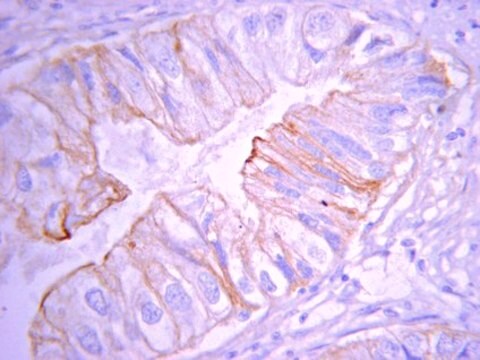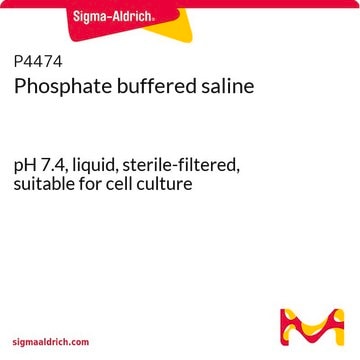05-143
Anti-PLA2 Antibody, secretory
Upstate®, from mouse
Sign Into View Organizational & Contract Pricing
All Photos(1)
About This Item
UNSPSC Code:
12352203
eCl@ss:
32160702
NACRES:
NA.41
Recommended Products
biological source
mouse
Quality Level
antibody form
purified antibody
clone
monoclonal
species reactivity
human
manufacturer/tradename
Upstate®
technique(s)
ELISA: suitable
immunohistochemistry: suitable
western blot: suitable
isotype
IgG1κ
NCBI accession no.
UniProt accession no.
shipped in
wet ice
target post-translational modification
unmodified
Specificity
human type II secretory PLA2 in sperm, disc and synovial fluid
Immunogen
Purified human PLA2; recognizes type II (secretory) PLA2.
Application
Research Category
Signaling
Signaling
Research Sub Category
Lipid Signaling
Lipid Signaling
This Anti-PLA2 Antibody, secretory is validated for use in ELISA, IH, WB for the detection of PLA2.
Quality
routinely evaluated on PLA2 under non-reducing conditions
Target description
14/18 kDa
Physical form
0.1M Tris-glycine, pH 7.4, 0.15M NaCl with 0.05% sodium azide
DEAE cellulose chromatography
Format: Purified
Storage and Stability
2 years at -20°C
Legal Information
UPSTATE is a registered trademark of Merck KGaA, Darmstadt, Germany
Disclaimer
Unless otherwise stated in our catalog or other company documentation accompanying the product(s), our products are intended for research use only and are not to be used for any other purpose, which includes but is not limited to, unauthorized commercial uses, in vitro diagnostic uses, ex vivo or in vivo therapeutic uses or any type of consumption or application to humans or animals.
Storage Class Code
12 - Non Combustible Liquids
WGK
WGK 1
Flash Point(F)
Not applicable
Flash Point(C)
Not applicable
Certificates of Analysis (COA)
Search for Certificates of Analysis (COA) by entering the products Lot/Batch Number. Lot and Batch Numbers can be found on a product’s label following the words ‘Lot’ or ‘Batch’.
Already Own This Product?
Find documentation for the products that you have recently purchased in the Document Library.
Detection of natural peptide antibiotics in human nasolacrimal ducts.
F P Paulsen, T Pufe, U Schaudig, J Held-Feindt, J Lehmann, J M Schroder, B N Tillmann
Investigative Ophthalmology & Visual Science null
X D Qu et al.
Infection and immunity, 66(6), 2791-2797 (1998-05-29)
We examined human tears for molecules that killed gram-positive bacteria. The principal mediator of bactericidal activity against staphylococci proved to be a calcium-dependent enzyme, secretory phospholipase A2. Whereas the concentration of secretory phospholipase A2 in the normal tear film exceeded
Angiotensin II type 2 receptor stimulation of neuronal delayed-rectifier potassium current involves phospholipase A2 and arachidonic acid
Zhu, M., et al
The Journal of Neuroscience, 18, 679-686 (1998)
G Dorsam et al.
Clinical chemistry, 41(6 Pt 1), 862-866 (1995-06-01)
Previously we reported that uremic plasma contained eight times more phospholipase A2 (PLA2) activity than control plasma (Costello et al., Clin Chem 1990;36:198-200). That study, however, did not distinguish between various PLA2s that could contribute to the observed increase. Therefore
Yan Fu et al.
Journal of neuroscience research, 85(13), 2870-2881 (2007-06-07)
Coherent anti-Stokes Raman scattering (CARS) microscopy, which allows vibrational imaging of myelin sheath in its natural state, was applied to characterize lysophosphatidylcholine (lyso-PtdCho)-induced myelin degradation in tissues and in vivo. After the injection of lyso-PtdCho into ex vivo spinal tissues
Our team of scientists has experience in all areas of research including Life Science, Material Science, Chemical Synthesis, Chromatography, Analytical and many others.
Contact Technical Service







